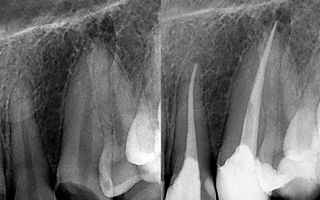Endodontics (root canal treatment)
Looking after the health of the soft tissues inside your teeth.

Root Canal treatment is used if decay or cracks have compromised a tooth’s nerve and blood supply. This can lead to the tooth ‘dying’. There is significant pain if an abscess forms.
However, if diagnosed early, modern dentistry can help treat these areas with little or no discomfort. This is often required when the nerve of a tooth has been damaged by trauma or, more commonly, tooth decay.
What is a root canal?
Our goal, through quality dental services for the entire family, is to help our patients keep their teeth for life. This treatment can help prevent premature tooth loss and, when combined with a dental crown, it will restore the function and comfort of your teeth and your smile.
Why might you need a root canal?
The most common indicators of a serious problem in your teeth are high sensitivity to hot or cold temperatures and pain or swelling in your gums.
However, some patients never experience any obvious symptoms, which is why it’s imperative to have regular check-ups every six months and receive quality dental services on time.

If you are experiencing any of the following symptoms, contact us immediately for a full diagnosis:
- Chronic tooth sensitivity to hot or cold liquids.
- Sensitivity while eating sweets.
- Sensitivity to biting.
- Spontaneous toothache, experienced without an obvious cause.
- Constant, severe or throbbing toothache.
- Tooth pain in response to atmospheric pressure changes, such as when flying.
- Swelling of the gums.
- Fissure sealings
- Extractions of loose baby teeth
This procedure involves the careful removal of the dead and dying structure in the roots of the tooth and replacing this with rubber based materials. The long-term success rate of this procedure is approximately 90 per cent.
Root Canal Therapy is the alternative to tooth extraction and is often required to retain/save a damaged tooth.
What happens during a root canal?
If you’re currently in pain or have overly-sensitive teeth, don’t wait to contact us in order to set up an appointment to fully diagnose your condition.
The 4-steps of a root canal
An opening is made down into the chamber of the tooth.
The nerve is removed from the chamber, and the root canal is cleaned and prepared for root filling. Our dentists use the rotary root canal system, which ensures a quick and simple procedure with minimal fuss and a high success rate.
Anti-infection medications may be placed in the chamber and antibiotics may be prescribed to ward off infection.
On the next visit the canals will be cleaned, and the root canals sealed and filled In most cases a crown will be required to hold the weakened tooth together.
We will happily communicate with you about all the various quality dental services available to save your smile and return your teeth to their former function and comfort levels.
Frequently Asked Questions
A root canal treatment in Australia depends on a number of factors, such as how many canals the tooth has (one canal makes for a simpler and faster procedure than a tooth with four canals), and whether you need additional appointments or sedation.
You may also need to factor in the cost of getting a dental crown, as this is an important follow-up to most root canals and can add an additional cost.
If you need financial assistance for your treatment, we offer an exclusive interest-free payment plan called SmileFund. With SmileFund, you can undergo your dental treatment and pay it off over time.
Yes, absolutely. Anyone who knows the pain of a soft tissue infection or the nerve dying inside the tooth knows just how worthwhile a root canal is. Not only does this treatment rid you of what can be severe dental pain, it also prevents the infection spreading further, and helps to preserve your natural tooth and avoid further dental treatments that you would need to replace it.
A dentist and an endodontist have the same basic training and skills, but an endodontist specialises in treatment of the soft tissues in the teeth. That’s why an endodontist will often perform complicated root canal procedures or other treatments that involve the soft tissue in the tooth.
The most common procedure that an endodontist performs is a root canal, but they can also fix cracked teeth, place dental implants, do root canal re-treatments, root end surgeries, and anything else relating to the soft tissue inside your tooth.
Sometimes, your dentist may not have the additional training or knowledge they would need in order to perform a treatment. This is most often the case for complicated root canal treatments, but your dentist may also send you to an Endodontist for other procedures, such as fixing an old root canal or placing a dental implant.


